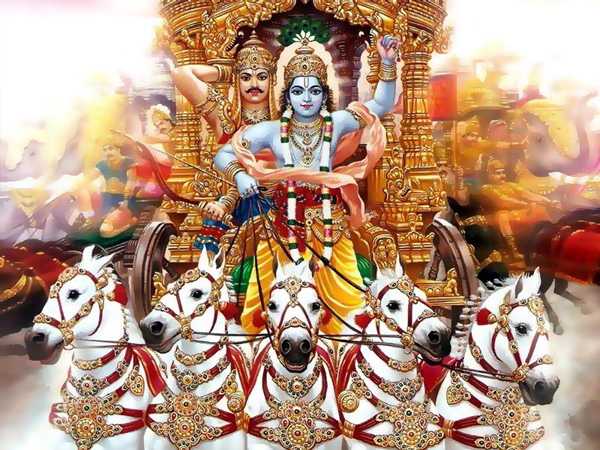Chapter 105

“Sanjaya said, ‘The illustrious son of Somadatta pierced each of the sonsof Draupadi, those great bowmen, with five arrows, and once more withseven arrows. Much afflicted, O lord, by that fierce warrior, they werestupefied and knew not for some time what to do. Then that crusher offoes, Satanika, the son of Nakula, piercing Somadatta’s son, that bullamong men, with a couple of arrows, uttered in joy a loud roar. The otherbrothers then, struggling vigorously, quickly pierced the wrathful son ofSomadatta, each with three straight shafts. Then the illustrious son ofSomadatta, O monarch, sped at them five shafts, piercing each of them inthe chest with one shaft. Then those five brothers, thus pierced by thathigh-souled warrior with his shafts, surrounded that hero on every sideand began to pierce him deeply with their shafts. Then the son of Arjuna,filled with rage, despatched with keen shafts, the four steeds ofSaumadatti to the region of Yama. And the son of Bhimasena, cutting offthe bow of the illustrious son of Somadatta, uttered a loud shout andpierced his foe with many sharp arrows. The son of Yudhishthira then,cutting off Saumadatti’s standard, felled it en the earth, while the sonof Nakula felled the enemy’s charioteer from his niche in the car. Thenthe son of Sahadeva, ascertaining the foe to be on the point of leavingthe field in consequence of the brothers, cut off, with a razor-facedarrow, the head of that illustrious warrior. That head, decked withear-rings of gold, fell on the earth and adorned the field like the sunof brilliant effulgence that rises at the end of the Yuga. Beholding thehead of the high-souled son of Somadatta thus fallen on the ground, thytroops, O king, overcome with fear, fled in all directions.
“The Rakshasa Alamvusha in that battle, filled with rage, fought with themighty Bhimasena, like Ravana’s son (Indrajit) with (Rama’s brother)Lakshmana. Beholding that Rakshasa and that human warrior engaged infight, all creatures experienced both joy and wonder. Then Bhima, O king,laughing the while, pierced that wrathful prince of Rakshasa, viz.,Rishyasringa’s son (Alamvusha), with nine keen shafts. Then thatRakshasa, thus pierced in battle, uttered a loud and awful sound, andrushed, with all his followers, against Bhima. Piercing Bhima then withfive straight shafts, he quickly destroyed in that battle, thirty carssupporting Bhima. And once more destroying four hundred cars ofBhimasena, the Rakshasa pierced Bhimasena himself with winged arrows.Then the mighty Bhima deeply pierced by the Rakshasa, sat down on theterrace of his car, overcome by a swoon. The son of the Wind-god then,recovering his senses, became filled with rage. Drawing his excellent andterrible bow that was capable of bearing a great strain, he afflictedAlamvusha, in every part of his body, with keen shafts. Thereupon, theRakshasa who resembled a huge mass of antimony, looked resplendent Oking, like a flowering Kinsuka. Whilst being struck in that battle withthose shafts sped from the bow of Bhima, the Rakshasa recollected theslaughter of his brother (Vaka) by the illustrious Pandava. Assuming thenan awful form, he addressed Bhima, saying, ‘Wait a little in this battle,O Partha! Behold today my prowess. O thou of wicked understanding, thatforemost of Rakshasas, viz., the mighty Vaka, was my brother. It is truehe was slain by thee. But that took place out of my sight.’ Having saidthese words unto Bhima, Alamvusha made himself invisible, and began tocover Bhimasena with a dense shower of arrows. Upon the disappearance ofthe Rakshasa, Bhima, O monarch, covered the welkin with straight shafts.Thus afflicted by Bhima, Alamvusha soon returned to his car. And soonagain, he entered into the bowels of the earth and once more becominglittle he suddenly soared into the sky. Alamvusha, assumed countlessforms. Now becoming subtle and now huge and gross, he began to roar likethe clouds. And he uttered diverse kinds of words and speeches allaround. And from the welkin there fell thousands of arrowy torrents, asalso darts, and Kunapas, and lances, and spiked maces, and short arrows,and scimitars, and swords, and thunders also. That awful downpour ofarrows caused by the Rakshasa, slew the troops of Pandu’s son on thefield of battle. And in consequence of that arrowy downpour, manyelephants also of the Pandava army were slain, and many steeds also, Oking, and many foot-soldiers. And a river was caused there, whose waterswere blood and whose eddies were constituted by cars. And it aboundedwith elephants that constituted its alligators. And the umbrellas ofcar-warriors constituted its swans, and the flesh and marrow of animals,its mire. And it teemed with the (cut off) arms of human beings thatconstituted its snakes. And it was haunted by many Rakshasas and othercannibals. And it wafted away, O king, countless Chedis and Panchalas andSrinjayas. Beholding him, O monarch, careering so fearlessly in thatbattle and seeing his prowess, the Pandavas became filled with anxiety;and joy filled the hearts of thy troops then. And amongst the latter,loud and terrible sounds of musical instruments, making the hair stand onend, arose. Hearing that loud uproar made by thy troops, the son of Panducould not bear it, as a snake cannot bear the clap of human palms. Witheyes red as copper in rage, with glances that like fire consumed everything, the son of the Wind-god, like Tvashtri himself, aimed the weaponknown by the name of Tvashtri. From that weapon were produced thousandsof arrows on all sides. And in consequence of those arrows, a universalrout was seen among thy troops.’ That weapon, shot in battle byBhimasena, destroying the effective illusion produced by the Rakshasa,greatly afflicted the Rakshasa himself. Struck in every part of his bodyby Bhimasena, the Rakshasa, then abandoning Bhimasena, fled towards thedivision of Drona. Upon the defeat of that prince of Rakshasa by thehigh-souled Bhima, the Pandavas caused every point of the compass toresound with their leonine roars. And filled with joy, they worshippedthe mighty son of Marut, like the Maruts worshipping Sakra after thedefeat in battle of Prahlada.'”




